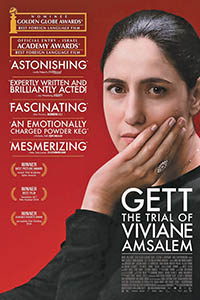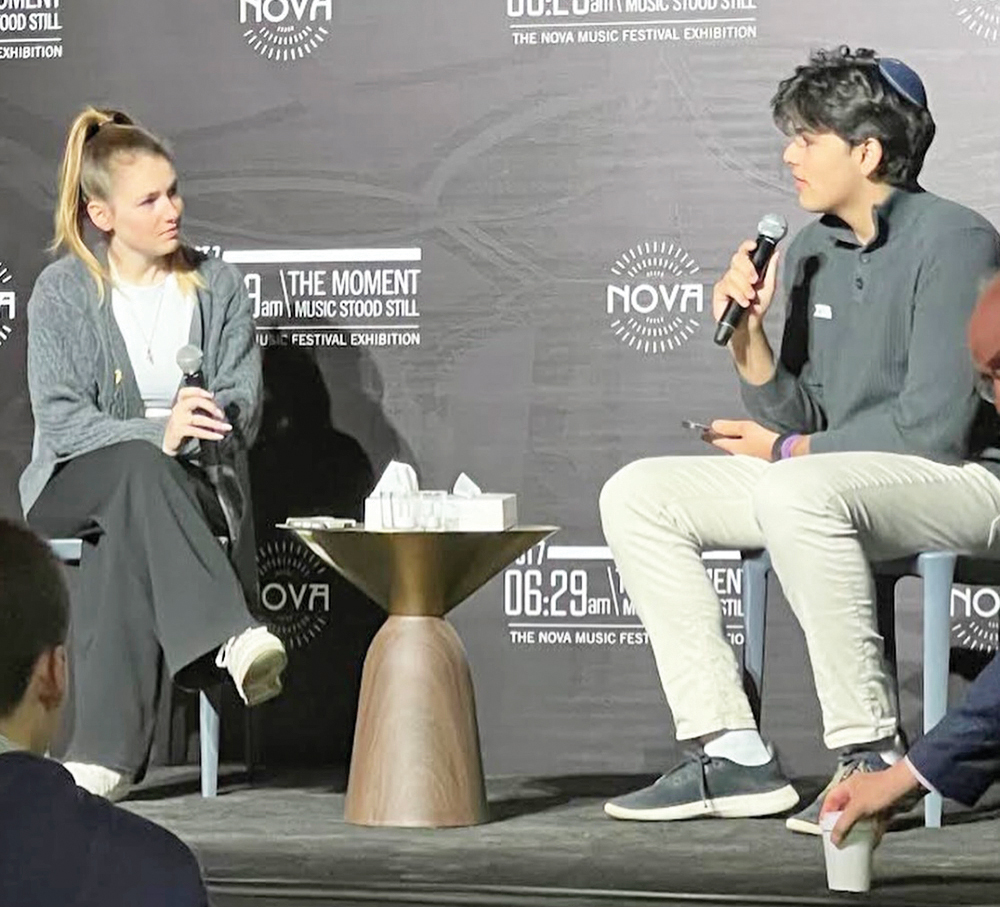

“Gett: The Trial of Viviane Amsalem” will be shown Motzei Shabbos, February 27, at Congregation Shaarei Orah, The Sephardic Congregation of Teaneck at 1425 Essex Road, to be followed by a conversation about the process of gittin with Rabbi Haim Jachter, rabbi of Shaarei Orah, mesader gittin (get administrator) with the Beth Din of Elizabeth, and chairman of the Agunah Prevention and Resolution Committee of the Rabbinical Council of America. Rabbi Jachter will discuss how halachic authorities have been working to prevent women from becoming agunot (divorced women whose husbands withhold the get), provide resources for agunah case resolution, and give an inside look at how he guides divorcing couples who come to him for a get. Due to limited seating, pre-paid reservations must be made by Friday, February 19. The entrance fee of $12 includes light refreshments. Reservations can be made through the synagogue office, (201)833-0800, or [email protected]
// ]]>
A form for reserving online can be found at http://www.sephardicteaneck.org/special-events.html. Doors open at 7:45 and the film will begin at 8:15.
“Gett,” an Israeli film, has won international awards and received glowing reviews for its finely crafted study of a woman first victimized by her estranged husband and then by the court. The gittin process can garner some rather angry reviews from women—and men—whose futures are held hostage by uncooperative spouses who withhold a get or refuse to accept it as a tool of emotional or financial blackmail.
You could rent the movie—but then you’d be left with a sense of despair, instead of being enlightened by Rabbi Jachter’s analysis of steps being taken to halachically reform the get process. It is incontrovertible that, according to Halacha, the get must be delivered by the husband, of his own free will, to his wife. But the techniques used in obtaining a get can be handled with sensitivity that takes the needs of both divorcing spouses into consideration.
“This is a wonderful opportunity for people to see that it does happen the way it is portrayed in the film but it doesn’t have to be this way,” said Rebbetzin Malca Jachter, who talked to JLNJ about the film and the gitten process along with her husband, Rabbi Jachter. “Halacha can’t be changed. But things can be done so there is a humanistic interaction and an understanding of the predicament.” Rebbetzin Jachter often attends the beth din with her husband so a woman will be comforted by having another woman present. “My husband has a sofer (scribe) with him and one or two other witnesses, and the husband. All those people are men. The woman comes into a room of men and can feel very unbalanced.”
Rabbi Jachter said he chose this particular film as the protagonist is Sephardic and her experience resonates with the many Israelis in the community. He will talk about what happens in the film and what shouldn’t happen, through the lens of his expertise as a dayan in the beth din who has administered about 2,000 gitten. “I hope people will come away with an awareness that we are trying to change the culture, to become more efficient. There are several points of light (rabbinic authorities), get administrators, who are kind and sensitive and go out of their way to resolve situations, like Rabbi Gedalia Dov Schwartz of Chicago (Beth Din of America), a rabbi’s rabbi, and Rabbi Teitz whom I serve under in Elizabeth.”
There is one big difference in the way divorce is handled in America and Israel. In Israel, civil and religious divorce are combined, while in the U.S. the functions are separate. A couple can elect to have a beth din adjudicate division of assets, but Rabbi Jachter said that most of the time couples go to secular courts and come to a beth din only for the get. So a woman can be divorced in the U.S. without a get, but she will not be able to remarry an Orthodox man.
Rabbi Jachter said the incidence of agunot has been greatly reduced by the introduction of the Binding Arbitration Agreement of the Beth Din of America (halachic prenuptial agreement), now standard in the Modern Orthodox community. The prenup was endorsed by the Rabbinical Council of America in 1993. Today, many rabbis will not officiate at a wedding if the couple does not sign.
The agreement mandates that if a couple stops living together, and the husband refuses to give a get when the beth din requests him to do so, the husband waives his halachic right to his wife’s earnings and pays her $150 per day in fulfillment of the halachic responsibility mandated by the ketubah. Rabbi Jachter said he is not aware of any current full-fledged agunot situations in Bergen County.
Rav Ovadia Yosef z”l, former spiritual leader of the Sephardic community in Israel, strongly endorsed the halachic prenup and was on the forefront of helping agunot. Rabbi Jachter shared this story to underline Rav Ovadia’s compassion and leadership: “A surgeon told Rav Ovadia he needed heart surgery immediately. He said to the surgeon, ‘Give me five hours.’ Why? He had to write a formal response permitting a woman to remarry. He was afraid that if he died on the operating table, no one else would have the authority to do it.”
Communal and social sanctions, also endorsed by Rav Ovadia, can be very motivating tactics. Rabbi Jachter shared another story to explain: “Rabbi Greenblatt of Memphis, Tennessee, was asked by a man who had refused to give his wife a get to officiate at his mother’s funeral on Erev Yom Kippur. Rabbi Greenwald refused to do the burial until the man gave the get.”
Rabbi Jachter, who chairs the Tanach department at Torah Academy of Bergen County (TABC), has been a dayan since 1993. A specialist in gittin, he visited every beth din in the area and said he affiliated himself with Rabbi Teitz because his was the best beit din in kindness and efficiency, in adhering to halacha, and in taking care of people.
Rabbi Jachter received a second smicha from Yeshiva University, under Rabbi Mordechai Willig, to administer gittin. He was also ordained by Rav Ovadia in Israel and spent a summer there sitting with the Israeli din.
The wounds incurred in a nasty battle over a get have caused people to leave the Orthodox fold and this is what Rabbi Jachter wants to prevent. “If they feel supported by the rabbinate helping them, they don’t leave.” Yet, even secular Jews come to him for a get. Israelis want a get to allow them to remarry in Israel. Or there are religious family members who understand the value.
Rabbi Jachter tells all the couples who come to him, “You went into marriage in a halachic way, go out the halachic way. You should be in a position to move on with your life.”
By Bracha Schwartz













